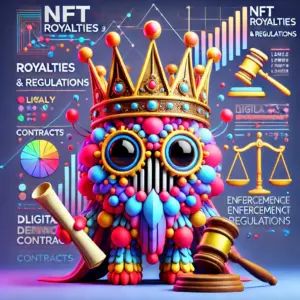The advent of non-fungible tokens (NFTs) has revolutionized the digital landscape, introducing a new paradigm for ownership, authenticity, and value in the realm of intangible assets. However, amidst the hype and excitement surrounding this emerging technology, it’s crucial to examine the ethical and social implications of NFTs to ensure their responsible and beneficial integration into our society.
Ownership and Intellectual Property Rights
NFTs have the potential to revolutionize the way we perceive ownership of digital assets. By assigning a unique identifier to each digital item, NFTs create a clear and verifiable record of ownership. This could empower creators to monetize their work directly, bypassing traditional intermediaries and reducing the risk of piracy.
However, NFTs also raise complex questions about intellectual property rights (IPR). While NFT ownership may grant the buyer certain exclusive rights, such as the ability to display or resell the asset, it doesn’t necessarily confer the right to reproduce or modify the underlying work. This can lead to disputes and challenges in enforcing IPR when dealing with NFTs.
Artistic Ownership and Rewards
NFTs were initially touted as a way to empower artists and ensure they receive fair compensation for their work. By providing a transparent and verifiable marketplace for digital artwork, NFTs could potentially disrupt the traditional art market, which often favors established galleries and collectors over individual creators.
However, there are concerns that the current NFT ecosystem favors speculation and hype over genuine appreciation of art. The high prices paid for some NFTs have led to accusations of speculation and money laundering, raising questions about whether NFTs are truly benefiting artists.
Environmental Impact
The creation and trading of NFTs rely on blockchain technology, which consumes a significant amount of energy. This energy consumption, primarily from cryptocurrency mining, has raised concerns about the environmental impact of NFTs.
Some estimates suggest that the energy consumption of the NFT market is comparable to that of a small country. This raises concerns about the sustainability of NFTs, particularly in light of the growing environmental crisis.
Fraud and Scams
The decentralized nature of the NFT market has made it vulnerable to fraud and scams. There have been reports of NFTs being created without the artist’s permission, and scammers have used phishing attacks to steal valuable digital assets.
The lack of regulation in the NFT market also makes it difficult to protect consumers. Without clear guidelines and enforcement mechanisms, it remains challenging to ensure the integrity and security of NFT transactions.
Accessibility and Inequality
The NFT market is currently dominated by wealthy individuals and institutions, making it difficult for many people to participate. The high transaction fees and complex technical requirements can be barriers to entry, creating a digital divide and exacerbating existing inequalities.
To address this issue, efforts are underway to develop more user-friendly and accessible NFT platforms. However, there is a need for further innovation and education to make NFTs more inclusive and accessible to a wider audience.
Conclusion
NFTs offer a transformative potential to reshape ownership, authenticity, and value in the digital world. However, it’s essential to carefully consider the ethical and social implications of this technology to ensure its responsible and beneficial adoption. By addressing issues such as IPR protection, artist remuneration, environmental impact, fraud prevention, and accessibility, we can harness the power of NFTs while mitigating potential risks and fostering a more equitable and sustainable digital landscape.






